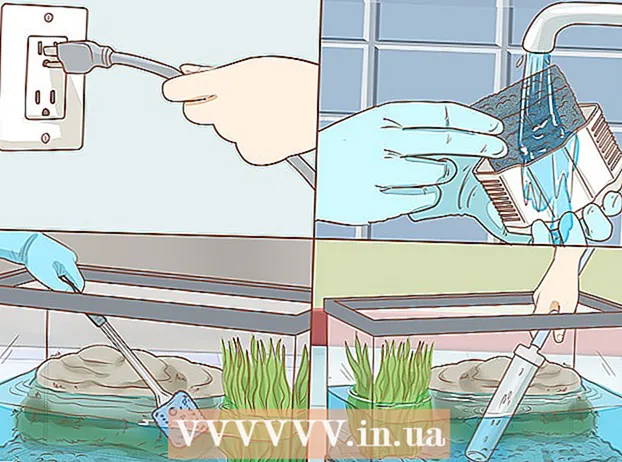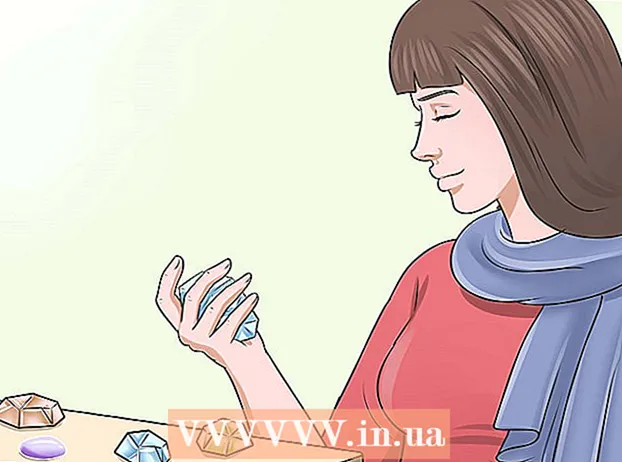
Content
High thyroid-stimulating hormone (TSH) levels are a sign of hypothyroidism (decreased activity) of the thyroid gland, a condition known as hypothyroidism. Hypothyroidism is a condition caused by a lack of thyroid hormones, which the body uses to control important metabolic or chemical processes. Hypothyroidism can cause fatigue, depression, weight gain, and lack of appetite. If left untreated, it can lead to obesity, infertility, heart disease, and joint pain. If you have hypothyroidism, you may want to lower your thyroid-stimulating hormone levels to relieve your symptoms. Thyroid medications should be taken to normalize TSH. You can also try to treat hypothyroidism by changing your eating and lifestyle habits.
Attention:the information in this article is for informational purposes only. Before using any methods, consult your doctor.
Steps
Method 1 of 2: Taking thyroid medications
- 1 Check your TSH level. If you have symptoms of hypothyroidism such as constipation, hoarseness, and fatigue, make an appointment with your doctor to get tested for hypothyroidism. Your doctor will refer you to a blood test to check for hypothyroidism.
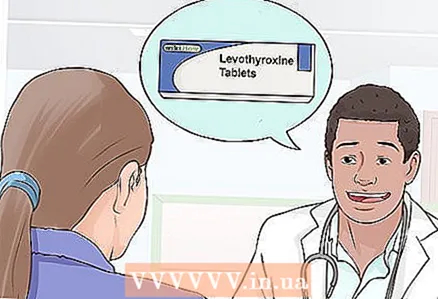 2 Ask your doctor for a prescription for thyroid medications. The most reliable way to reduce TSH levels is to take a synthetic thyroid hormone called levothyroxine sodium (Eutirox, L-thyroxine, Bagotyrox, L-Tyrox, Tyro-4). It can be bought with a doctor's prescription. This oral medication can help restore hormone levels and relieve symptoms of hypothyroidism. It must be taken once a day.
2 Ask your doctor for a prescription for thyroid medications. The most reliable way to reduce TSH levels is to take a synthetic thyroid hormone called levothyroxine sodium (Eutirox, L-thyroxine, Bagotyrox, L-Tyrox, Tyro-4). It can be bought with a doctor's prescription. This oral medication can help restore hormone levels and relieve symptoms of hypothyroidism. It must be taken once a day. - Your condition should improve within 3-5 days after you start taking your medication. After 4-6 weeks, you should be clear of all symptoms.
- Follow your doctor's instructions regarding the dosage of the drug. Never take an overdose of the medication.
- To keep TSH levels low, thyroid medications must be taken throughout life (fortunately, they are relatively inexpensive). You can find out the exact cost of the drug at the pharmacy: drugs produced under different brands can cost differently.
- 3 Learn about the side effects of the drug. If you take a high dose of the drug with a high level of thyroid-stimulating hormone, the patient may experience side effects. The doctor will have to adjust the dosage to match the needs of the body. You may also be prescribed medication to which you may have a bad reaction. Get immediate medical attention if you develop symptoms of an allergic reaction to levothyroxine (rash, difficulty breathing, and swelling of your face, lips, tongue, or throat). Seek medical attention immediately if you experience any of the following symptoms:
- fast heartbeat or arrhythmia;
- chest pain and / or difficulty breathing;
- Fever, fever, and / or excessive sweating
- feeling of extreme cold;
- weakness, fatigue and / or sleep disturbance;
- memory impairment, depression, or irritability;
- muscle pain;
- dry skin and hair, or hair loss;
- changes in the menstrual cycle;
- vomiting, diarrhea, changes in appetite and / or changes in weight.
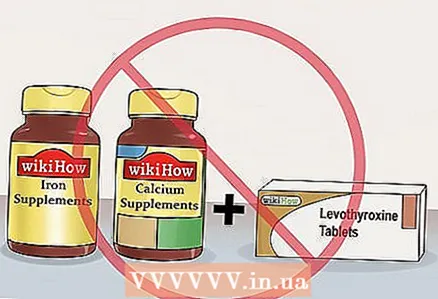 4 Stop taking certain supplements while taking your medicine. Iron and calcium supplements can impair the body's ability to absorb the medicine. You should also stay away from medications that contain cholestyramine and aluminum hydroxide.
4 Stop taking certain supplements while taking your medicine. Iron and calcium supplements can impair the body's ability to absorb the medicine. You should also stay away from medications that contain cholestyramine and aluminum hydroxide. - Before you start taking thyroid medications, you should check with your doctor if you are taking any other medications or dietary supplements.
- Typically, thyroid medications are best taken on an empty stomach, about half an hour before meals. For reliability, read the instructions for the drug.
- 5 Be wary of “natural” thyroid medications. "Natural" thyroid replacement drugs are made from the thyroid gland of animals (usually pigs). They can be ordered online as a dietary supplement. However, these drugs have not been purified or approved by the RF Ministry of Health. Do not buy or take "natural" thyroid medications unless prescribed by your doctor.
- Such "natural" counterparts can be sold as an extract or dried.
- If you'd like to know more, ask your doctor about Armor Thyroid, a prescription natural thyroid extract.
 6 Monitor your progress while taking your medication. Get regular check-ups to make sure your medications are actually lowering your TSH levels. After 2-3 months, your doctor may change the dosage of the drug so that your body is getting enough hormones.
6 Monitor your progress while taking your medication. Get regular check-ups to make sure your medications are actually lowering your TSH levels. After 2-3 months, your doctor may change the dosage of the drug so that your body is getting enough hormones. - With the correct dosage, after 1–2 months of taking the drug, your condition should improve and you begin to feel less tired. Your diet and weight should also return to normal.
 7 Check your TSH level annually. Get an annual check-up with your doctor to make sure your thyroid-stimulating hormone is at the right level. Your doctor should check your TSH level at least once a year to make sure the medication is working.
7 Check your TSH level annually. Get an annual check-up with your doctor to make sure your thyroid-stimulating hormone is at the right level. Your doctor should check your TSH level at least once a year to make sure the medication is working. - If you have switched to a new dosage of levothyroxine, you should be checked more often than once a year.
- People with hypothyroidism must take thyroid medications throughout their lives. Do not stop taking your medication if you feel better as symptoms may return.
Method 2 of 2: Diet and lifestyle
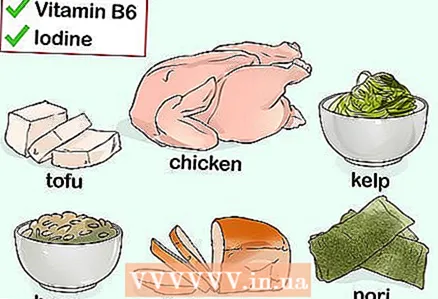 1 Consume foods rich in B vitamins and iodine. Your diet should consist of healthy sources of protein such as tofu, chicken and beans, as well as foods rich in vitamin B (whole grains, nuts and seeds).Include in your diet an equal amount of fruits and vegetables (especially seafood as they are high in iodine). Foods high in iodine are good for the thyroid gland.
1 Consume foods rich in B vitamins and iodine. Your diet should consist of healthy sources of protein such as tofu, chicken and beans, as well as foods rich in vitamin B (whole grains, nuts and seeds).Include in your diet an equal amount of fruits and vegetables (especially seafood as they are high in iodine). Foods high in iodine are good for the thyroid gland. - Try eating seaweed like seaweed, nori, and kombu at least once a day. Add seaweed to salad or soup to increase the iodine content of your diet. Kombu can be added to beans or meat. A wide variety of products can be wrapped in nori like rolls.
- Nuts and seeds can be added to quick-fry dishes, quinoa, and salads.
 2 Exercise regularly. Exercise not only improves metabolism, but also alleviates the side effects of hypothyroidism, such as fatigue, depression, and weight gain. Run or ride your bike. Sign up for a gym and work out there. Exercise at least 30 minutes a day.
2 Exercise regularly. Exercise not only improves metabolism, but also alleviates the side effects of hypothyroidism, such as fatigue, depression, and weight gain. Run or ride your bike. Sign up for a gym and work out there. Exercise at least 30 minutes a day. - If you want to stay active and reduce your stress levels, sign up for a yoga class. Look for yoga classes at your local gym or yoga studio.
 3 Get enough vitamin D daily. Try to go out in the sun for at least 20-30 minutes in the early morning or evening. Face the sun and enjoy its rays. Low vitamin D levels have been linked to hypothyroidism; level it up and you may be better off.
3 Get enough vitamin D daily. Try to go out in the sun for at least 20-30 minutes in the early morning or evening. Face the sun and enjoy its rays. Low vitamin D levels have been linked to hypothyroidism; level it up and you may be better off. - If you live in an area that lacks direct sunlight (especially in winter), talk to your doctor about taking vitamin D supplements.
 4 Reduce stress and anxiety. Keep your stress and anxiety levels under control to avoid exacerbating thyroid problems. Do something relaxing like drawing, painting, or knitting. Engage in a hobby you love to relieve stress and anxiety. Exercise is also effective in relieving stress.
4 Reduce stress and anxiety. Keep your stress and anxiety levels under control to avoid exacerbating thyroid problems. Do something relaxing like drawing, painting, or knitting. Engage in a hobby you love to relieve stress and anxiety. Exercise is also effective in relieving stress. - Stress can also be relieved with breathing exercises and weekly yoga sessions.

